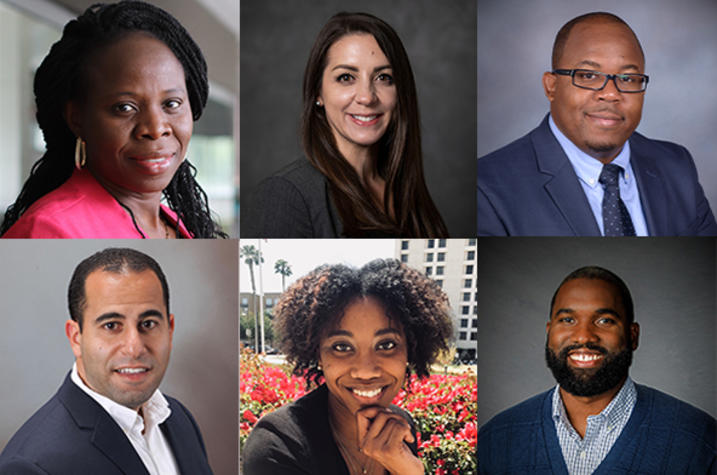Research Scholars Program Created to Sustain Inclusive Research Success

LEXINGTON, Ky. (April 19, 2021) — A new program aimed at ensuring diversity and inclusion in research by promoting faculty success began this month with the first cohort of junior faculty from six University of Kentucky colleges.
The Research Scholars Program (RSP) was created by the Office of the Vice President for Research, with support from the Office for Faculty Advancement, Center for Health Equity Transformation, Center for Clinical and Translational Science, and the colleges of Nursing, Public Health, Health Sciences, Medicine, Education, and Arts and Sciences.
RSP is aligned with national priorities for research diversity, including the National Institutes of Health (NIH) Faculty Institutional Recruitment for Sustainable Transformation (FIRST) program goal of creating cultures of inclusive excellence at NIH-funded institutions by implementing well-integrated, evidence-based strategies and evaluating their impact on metrics of institutional culture, inclusive excellence and diversity.
Lisa Cassis, vice president for research, said, “While progress has been made toward greater diversity of trainees in biomedical and behavioral sciences, progress has been slow in diversifying faculty and ensuring their research success. That’s why we created this program.”
RSP has three aims. Aim 1 is to provide professional development curricula to support the cohort’s academic and professional research success. AIM 2 is to engage UK’s collaborative scientific community through multilevel mentorship, sponsorship and coaching to embed the cohort in research environments committed to inclusive excellence, collegiality and productivity. AIM 3 is to establish a scientific and social networking structure for the cohort to reduce isolation, build community and provide support for faculty to overcome institutional or structural challenges, and facilitate connections within the research community and the overarching institution.
“We developed the Research Scholars Program using survey, focus group and interview data, evidence-based programs, and input from our 15-member Faculty Advisory Committee,” said Nancy Schoenberg, RSP co-developer and director. “We were pleased to welcome our first faculty cohort with our kickoff on April 2, 2021.”
The faculty cohort will engage in scientific networking and receive sponsorship through UK’s seven multidisciplinary Research Priority Areas (diversity & inclusion, substance use, cancer, diabetes & obesity, cardiovascular diseases, energy and neuroscience).
Stephanie White, associate dean for diversity and inclusion in the College of Medicine and co-developer of RSP, said, “The opportunities for RSP and our cohort are limitless. The robust interest in the program stems from not only the need to forge connections across our colleges and research enterprises, but also from the palpable institutional commitment to the university’s diversity, equity and inclusion initiatives.”
“Most of us have experienced the power of coaching, be it under formal terms like mentoring, teaching or apprenticeship. To harness the full potential of RSP faculty and the coaching committee, our coaching applications will be customized to fit the individual RSP faculty member,” said Keith B. Wilson, professor of education, and chair of the RSP coaching committee.
Kevin Pearson, professor of pharmacology and nutritional sciences and RSP co-director, said, “Mentorship from the six RSP peers, near-peers who recently received external grant funding, and more senior scientific mentors are all key components to the RSP and will help to build a network and contribute to the long-term research productivity of the participating junior faculty."
“This is an intensive program that leverages stellar programming and committed faculty mentors from across the university to enhance the research careers of talented junior faculty members. Through the Research Scholars Program and other initiatives, the University of Kentucky is acknowledging that optimal research impact and innovative discovery depends on nurturing and encouraging the talents of all people,” Schoenberg said.
Cohort 1 Faculty
- Adebola Adegboyega, College of Nursing, Cervical cancer among African immigrant women and health disparities
- Joseph Benitez, College of Public Health, Health economics and empirical health policy analysis using applied econometrics techniques focused on Medicaid
- Jean Fry, College of Health Sciences, Rehabilitation following ACL tear and reconstruction surgery, rehabilitation nutrition, obesity, Type 2 diabetes, and precision medicine
- Cetewayo Rashid, College of Medicine, Environmental factors that contribute to the development of Type 2 diabetes
- Michael Samaan, College of Education, Use of biomechanics and musculoskeletal imaging to better understand the mechanisms and effects of lower extremity joint diseases
- Lauren Whitehurst, College of Arts and Sciences, Body/brain interactions during sleep to produce regulatory effects on cognition and health
Faculty Advisory Committee
- Chana Akins, Office of Faculty Advancement, College of Arts and Sciences
- Katie Cardarelli, Office of Faculty Advancement Health, College of Public Health
- Linda Dwoskin, College of Pharmacy
- Anita Fernander, College of Medicine
- Candice Hargons, College of Education
- Debra Harley, College of Education
- Kathy Grzech, Proposal Development Office
- Carrie Oser, College of Arts and Sciences
- Michael Rowland, College of Medicine
- Brittany Smalls, College of Medicine
- Greg Smith, College of Arts and Sciences
- Lisa Tannock, College of Medicine
- Donna Wilcock, College of Medicine
- Keith B. Wilson, College of Education
- Guigen Zhang, College of Engineering




